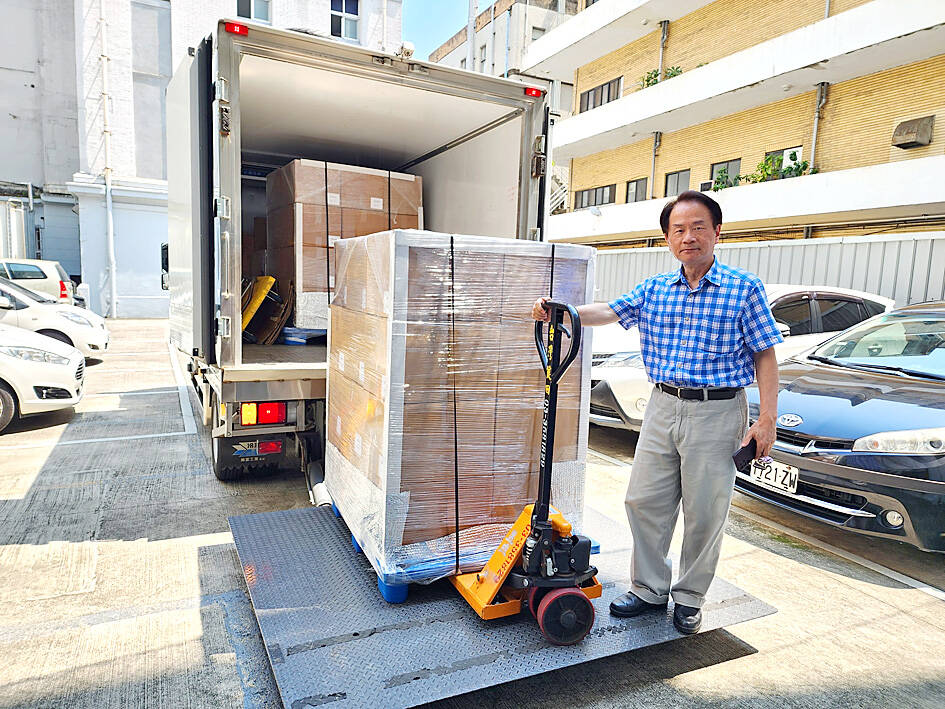The diaries of former Republic of China (ROC) presidents Chiang Kai-shek (蔣介石) and Chiang Ching-kuo (蔣經國) arrived in Taiwan on Thursday, and are to be published by Academia Historica from October, the state archives said.
The documents, previously housed at Stanford University’s Hoover Institution Library & Archives, were sent by the California research institute on a flight that landed at Taiwan Taoyuan International Airport early on Thursday morning, the state archives said in a press statement later that day.
The 59 boxes of documents delivered to the state archives include the two former presidents’ diaries dated from 1917 to 1979, as well as private letters, manuscripts, telegrams, microforms, official documents and other historic materials, the archives said.

Photo courtesy of Academia Historica
These historic materials first arrived at the Hoover Institution after it signed an agreement in 2005 with Chiang Ching-kuo’s daughter-in-law Chiang Fang Chih-yi (蔣方智怡), which stipulated that the institute could curate the diaries for 50 years.
This led to years of legal wrangling over rightful ownership of the documents.
Chiang Fang and other family members began transferring ownership of the diaries to Academia Historica in 2013, making the state archives the official custodian, the archives said.
Last year, the High Court ruled that documents produced by the two former presidents while they were in office were the property of the country, while personal materials kept when they were not president belonged to the Chiang family, the archives said.
The Taiwanese court ruling was accepted in July by a court in California — which also first began hearing an ownership case brought by Stanford in 2013 — and ordered the university to return the documents to Academia Historica within 60 days, the archives said.
Academia Historica said that it plans to publish the first volume of Chiang Kai-shek’s diary — kept from 1948 to 1954 — in late October, and Chiang Ching-kuo’s diary — kept from 1970 to 1979 — toward the end of this year.
The historic documents would also be digitized for researchers.
The state archives already runs an online presidential database that covers every ROC president from Chiang Kai-shek, who took office in 1948, to Tsai Ing-wen (蔡英文), who is to leave office after she completes her two four-year terms in May next year.
In a press release issued on Friday, the Hoover Institution announced that the handwritten diaries, including portions of the collection that were previously unavailable to the public, would remain accessible for academic purposes.
The Chiang diaries are one of the most requested items by researchers and contain decades of valuable political and foreign policy insights of Taiwan’s past leaders, the institute said.
Academics using the diaries have revised and expanded the understanding of modern China, the Cold War and global history, it said.

MAKING WAVES: China’s maritime militia could become a nontraditional threat in war, clogging up shipping lanes to prevent US or Japanese intervention, a report said About 1,900 Chinese ships flying flags of convenience and fishing vessels that participated in China’s military exercises around Taiwan last month and in January have been listed for monitoring, Coast Guard Administration (CGA) Deputy Director-General Hsieh Ching-chin (謝慶欽) said yesterday. Following amendments to the Commercial Port Act (商港法) and the Law of Ships (船舶法) last month, the CGA can designate possible berthing areas or deny ports of call for vessels suspected of loitering around areas where undersea cables can be accessed, Oceans Affairs Council Minister Kuan Bi-ling (管碧玲) said. The list of suspected ships, originally 300, had risen to about 1,900 as

Japan’s strategic alliance with the US would collapse if Tokyo were to turn away from a conflict in Taiwan, Japanese Prime Minister Sanae Takaichi said yesterday, but distanced herself from previous comments that suggested a possible military response in such an event. Takaichi expressed her latest views on a nationally broadcast TV program late on Monday, where an opposition party leader criticized her for igniting tensions with China with the earlier remarks. Ties between Japan and China have sunk to the worst level in years after Takaichi said in November that a hypothetical Chinese attack on Taiwan could bring about a Japanese

MORE RESPONSIBILITY: Draftees would be expected to fight alongside professional soldiers, likely requiring the transformation of some training brigades into combat units The armed forces are to start incorporating new conscripts into combined arms brigades this year to enhance combat readiness, the Executive Yuan’s latest policy report said. The new policy would affect Taiwanese men entering the military for their compulsory service, which was extended to one year under reforms by then-president Tsai Ing-wen (蔡英文) in 2022. The conscripts would be trained to operate machine guns, uncrewed aerial vehicles, anti-tank guided missile launchers and Stinger air defense systems, the report said, adding that the basic training would be lengthened to eight weeks. After basic training, conscripts would be sorted into infantry battalions that would take

DEEP-STRIKE CAPABILITY: The scenario simulated a PLA drill that turned into an assault on Taiwan’s critical infrastructure, with the launchers providing fire support Taiwan yesterday conducted this year’s first military exercises at Longsiang Base in Taichung, demonstrating the newly acquired High Mobility Artillery Rocket System’s (HIMARS) ability to provide fire support and deep-strike capabilities. The scenario simulated an attack on Penghu County, with HIMARS trucks immediately rolling into designated launch areas and firing barrages at the Wangan (望安) and Cimei (七美) islands, simulating the provision of fire support against invading forces. The HIMARS are supposed to “fire and leave,” which would significantly increase personnel and equipment survivability, a military official said. The drill simulated an exercise launched by the Chinese People’s Liberation Army (PLA) Eastern